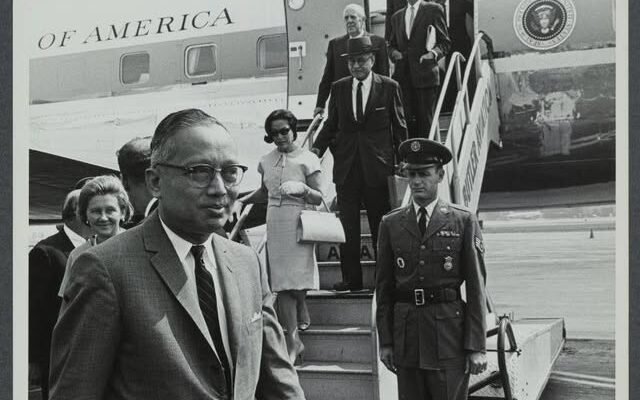The mystery of U Thant and the 1965-67 Nobel Peace Prize

In October 1965 everyone on the Nobel Peace Prize Committee voted to award that year’s prize to then U.N. Secretary-General U Thant, for defusing the Cuban Missile Crisis, negotiating the ceasefire ending the 1965 India-Pakistan war, his other mediation efforts, and for his ongoing search for a peaceful settlement of the war in Vietnam.
Everyone except the chairman – Norwegian politician Gunnar Jahn – who effectively vetoed giving the prize to U Thant (even though the committee was meant to work by majority vote).
The Norwegian government had actually informed the Secretary-General that he would be receiving the 1965 Nobel Peace Prize, only to tell him the decision had been reversed a few days later.
Jahn never explained why he changed his mind at the last minute. He would only say that U Thant was simply doing ‘his job’.
UN Under Secretary-General Ralph Bunche, himself a Nobel Laurate (for his work negotiating the 1949 Arab-Israeli Armistice Agreements) called Gunnar Jahn’s stance a “gross injustice to U Thant.”
October 1965 was exactly the same time the Secretary-General’s opposition to Washington’s war in Vietnam (following a failed attempt to broker secret talks between Hanoi and the White House) was becoming more public and gaining traction both in the US and internationally, much to the annoyance of Lyndon Johnson, then up for reelection. A Nobel Peace Prize would have only boosted U Thant’s increasingly strident calls for an immediate ending to the bombing of North Vietnam.
In 1966 and 1967 the committee remained deadlocked with Jahn continuing to refuse U Thant’s selection; as a result, in both years no one won the Nobel Peace Prize.
What pressure Washington was able to bring to bear on the Nobel committee is not known.
Gunnar Jahn, the chairman of the Norwegian Nobel Committee in 1965, repeatedly vetoed the nomination of UN Secretary-General U Thant for the Nobel Peace Prize. While the rest of the committee wanted to give the prize to Thant, Jahn’s refusal led to a deadlock that prevented him from receiving the award.
More details about this controversial decision
- Committee disagreement: The Norwegian Nobel Committee was deeply divided over the award for three years (1965, 1966, and 1967). According to Walter Dorn, who has written about U Thant, all the other members of the committee wanted the prize to go to the Secretary-General.
- Alternative winner: Because of the deadlock over U Thant, the 1965 Nobel Peace Prize was ultimately awarded to UNICEF instead.
- Continuation of the deadlock: Jahn’s objection continued in 1966 and 1967, and as a result, no Nobel Peace Prize was awarded in either of those years.
- Unknown motive: The exact reason for Jahn’s opposition to Thant is not officially known. Some sources suggest that his refusal may have been politically motivated.
- U Thant’s quiet response: Although the decision was perceived as a “gross injustice” by others, Thant himself was modest about his nomination and expressed pleasure that UNICEF was recognized instead.
Source: Thant Myint-U and AI generated content


